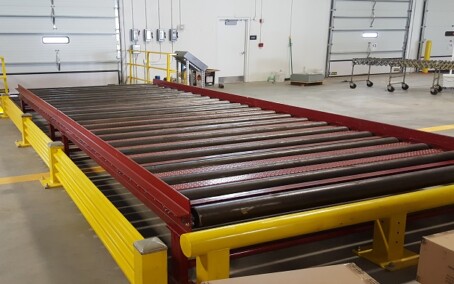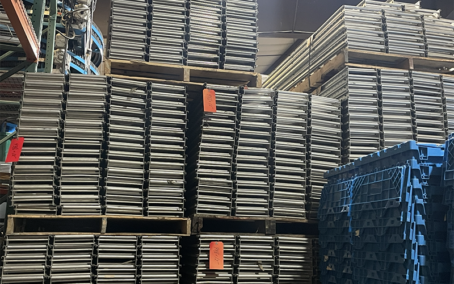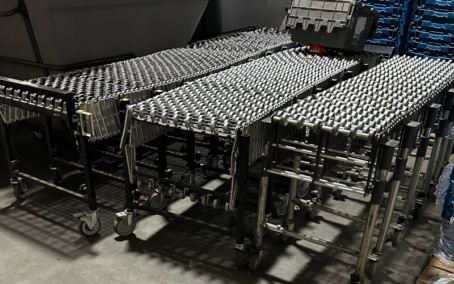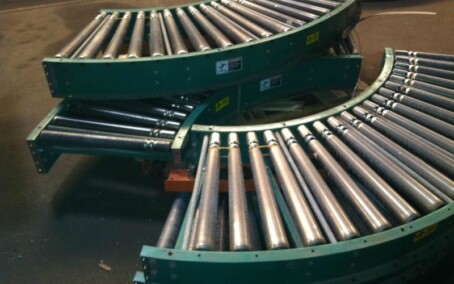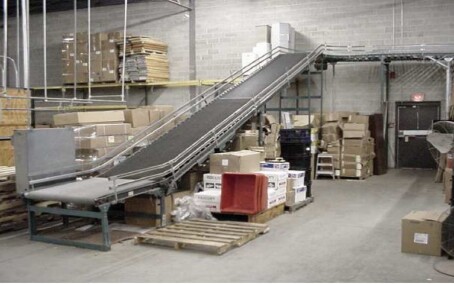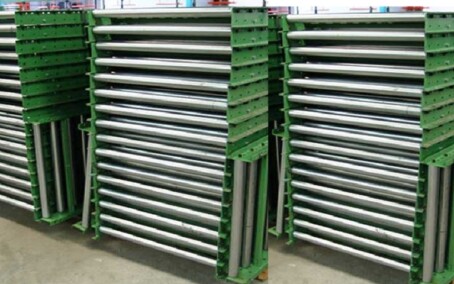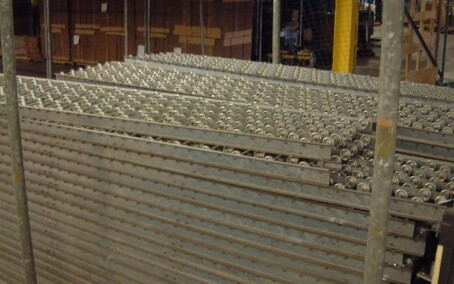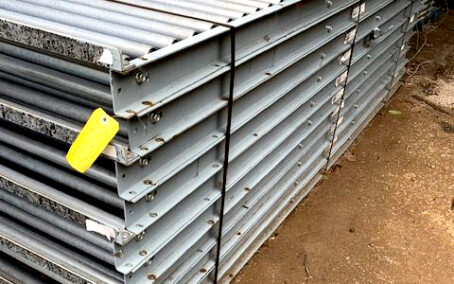In the fast-paced realm of industrial logistics, efficiency is key. Enter conveyor systems, the unsung heroes of smooth operations in warehouses, distribution centers, and manufacturing facilities worldwide. These ingenious mechanisms serve as the backbone of material handling, effortlessly transporting goods from one point to another with precision and reliability.
Conveyor systems encompass a variety of equipment designed to streamline the movement of goods, ranging from raw materials to finished products. Whether it's a sprawling warehouse or a compact assembly line, conveyors and conveying systems are indispensable tools for optimizing workflow and maximizing productivity.
But what exactly are conveyor systems? At their core, they consist of motorized belts, rollers, or chains that move items along a predefined path. These paths can be horizontal, inclined, or even vertical, accommodating diverse layouts and operational needs. From heavy-duty steel conveyor belts to flexible roller conveyors, the versatility of conveyors caters to a wide array of industries and applications.
More than mere transportation devices, conveyor systems represent a paradigm shift in material handling efficiency. Gone are the days of manual labor and cumbersome processes; today's industrial conveyors automate tasks and minimize downtime, revolutionizing the way goods move within facilities.
Let's delve deeper into the world of conveyor systems, exploring their myriad benefits, the various types available, reputable manufacturers, and why they're often referred to as the lifeline of modern industry. Join us as we unravel the intricacies of these mechanical marvels and discover how they can elevate your operational efficiency to new heights.
About Conveyor Systems
Conveyor systems epitomize efficiency in material handling. These ingenious mechanisms, comprising motorized belts, rollers, or chains, seamlessly transport goods within warehouses, distribution centers, and manufacturing facilities. But what exactly is a conveyor, and what advantages does it offer over traditional methods of material movement?
What is a Conveyor?
At its core, a conveyor is a mechanical device used to move goods from one location to another along a predefined path. Unlike manual handling or traditional transportation methods, such as forklifts or manual carts, conveyors automate the process, reducing labor costs and minimizing the risk of human error. Whether it's moving heavy loads across long distances or facilitating the assembly of products on a production line, conveyors excel in streamlining material flow and optimizing operational efficiency.
Advantages of Conveyor Systems
Increased Efficiency
Perhaps the most significant advantage of conveyor systems is their ability to enhance efficiency in material handling operations. By automating the transportation process, conveyors eliminate the need for manual labor, resulting in faster throughput and reduced cycle times. This increased efficiency translates to higher productivity and lower operational costs for businesses.
Enhanced Safety
Safety is paramount in any industrial setting, and conveyor systems play a crucial role in promoting a safer work environment. By reducing the need for manual handling and minimizing the risk of accidents associated with heavy lifting and transportation, conveyors help prevent workplace injuries and ensure employee well-being.
Versatility and Adaptability
Conveyor systems come in a variety of configurations and designs, making them highly versatile and adaptable to different industries and applications. Whether it's a straight-line conveyor for simple point-to-point transportation or a complex network of interconnected conveyors for intricate material handling tasks, the flexibility of conveyor solutions allows businesses to tailor solutions to their specific needs.
Improved Workflow
With conveyor systems, material flow becomes more streamlined and predictable, leading to improved workflow management. By eliminating bottlenecks and reducing downtime associated with manual handling, conveyors enable smoother operations and better coordination between different stages of the production or distribution process.
Cost Savings
In addition to improving operational efficiency, conveyor offers significant cost savings over time. By reducing labor costs, minimizing product damage, and optimizing space utilization, conveyors help businesses maximize their return on investment and achieve greater profitability in the long run.
Environmental Sustainability
In an era where environmental sustainability is increasingly important, conveyor systems offer eco-friendly solutions for material handling. By optimizing energy consumption, reducing waste, and minimizing carbon emissions associated with transportation, conveyors help businesses minimize their environmental footprint and contribute to a greener future.
Conveyor systems represent a fundamental shift in the way goods are transported and handled in industrial settings. With their myriad benefits, including increased efficiency, enhanced safety, and cost savings, conveyors have become indispensable tools for businesses seeking to optimize their material handling operations. As we delve deeper into the world of conveyor systems, we'll explore the various types available, reputable manufacturers, and additional advantages that make them the preferred choice for modern industry.
Applications of Industrial Conveyor
Assembly Lines
In manufacturing facilities, assembly lines rely heavily on conveyor systems to streamline production processes. Conveyors facilitate the movement of components and parts along the assembly line, ensuring a continuous flow of materials to workers stationed at different workstations. This seamless integration of conveyor systems optimizes production efficiency, reduces manual handling, and enables faster assembly of products.
Distribution Centers
Distribution centers serve as hubs for receiving, storing, and dispatching goods to their respective destinations. Conveyor systems play a critical role in these facilities by automating the movement of packages and pallets throughout the distribution process. From sorting and routing parcels to loading and unloading trucks, conveyors ensure swift and efficient handling of goods, minimizing processing times and expediting order fulfillment.
Warehousing
In warehouses, conveyor systems serve as the backbone of warehouse material handling operations, facilitating the movement of goods within storage facilities. Conveyors transport items from receiving areas to designated storage locations, maximizing storage space utilization and enabling efficient inventory management. Whether it's handling bulk materials, palletized goods, or individual items, conveyor enhances throughput and accuracy in warehouse operations.
Packaging
Packaging operations rely on conveyor systems to automate the packaging process and ensure consistency and precision in product packaging. Conveyors transport products through various stages of the packaging line, including filling, sealing, labeling, and palletizing. By eliminating manual handling and streamlining packaging workflows, conveyor improves productivity, reduce packaging errors, and enhance product presentation.
Food Processing
In the food processing industry, conveyor systems play a crucial role in ensuring hygienic and efficient handling of food products. Conveyors transport raw materials, ingredients, and finished products throughout the production process, minimizing contamination risks and maintaining food safety standards. Whether it's conveying fruits and vegetables in a processing plant or transporting packaged food products in a distribution center, conveyor upholds the highest standards of cleanliness and sanitation.
Automotive Manufacturing
Automotive manufacturing facilities rely on conveyor systems to orchestrate complex assembly processes with precision and efficiency. Conveyors transport vehicle components and parts along the production line, facilitating sequential assembly and integration of various systems. From chassis and engine assembly to final vehicle inspection, conveyor systems ensure smooth and synchronized operations, enabling automotive manufacturers to meet production targets and quality standards.
Industrial conveyor systems find diverse applications across a wide range of industries, from manufacturing and distribution to warehousing and food processing. By automating material handling processes, streamlining workflows, and enhancing operational efficiency, conveyor plays a vital role in driving productivity and profitability for businesses. As we continue to innovate and adapt to evolving industry needs, conveyor will remain indispensable tools for optimizing material handling operations in the modern industrial landscape.
Items Moved on Conveyor Systems
General Goods
Conveyor systems are incredibly versatile, capable of transporting a wide range of items across various industries. One of the primary functions of conveyor is to transport general goods, including boxes, cartons, and packages of various shapes and sizes. Whether it's moving consumer goods in distribution centers or handling parcels in shipping facilities, conveyors provide a reliable and efficient means of transporting these items from one location to another.
Raw Materials
Conveyor systems are also adept at handling raw materials, such as metals, plastics, and lumber, in manufacturing and processing plants. From feeding materials into production machinery to transporting bulk materials between different stages of the manufacturing process, conveyors play a crucial role in streamlining material flow and optimizing operational efficiency in industrial settings.
Finished Products
In addition to transporting raw materials, conveyor systems are equally capable of handling finished products in manufacturing facilities and distribution centers. Whether it's conveying packaged goods for storage and distribution or transporting finished products for final inspection and packaging, conveyors ensure smooth and efficient movement of goods throughout the production and supply chain.
Automotive Components
Automotive manufacturing facilities rely heavily on conveyor systems to transport various components and parts along the production line. From engine blocks and chassis frames to smaller components like bolts and screws, conveyors facilitate the assembly process by ensuring the timely and precise delivery of parts to assembly stations. This seamless integration of conveyor helps automotive manufacturers maintain high levels of productivity and quality in their production processes.
Bulk Materials
Conveyor systems are widely used for transporting bulk materials, such as grains, ores, and aggregates, in industries such as mining, agriculture, and construction. Whether it's loading materials onto ships for export or transferring aggregates between processing units in a quarry, conveyors offer an efficient and cost-effective solution for handling bulk materials over long distances and varying terrain.
Consumer Goods
In retail and e-commerce fulfillment centers, conveyor systems play a crucial role in handling consumer goods, ranging from clothing and electronics to household products and appliances. Conveyors transport these items through various stages of the order fulfillment process, including picking, packing, and shipping, ensuring timely delivery to customers while minimizing errors and delays in the supply chain.
Conveyor systems offer unparalleled versatility and efficiency in transporting a wide range of items across diverse industries. From raw materials and finished products to automotive components and bulk materials, conveyors play a vital role in optimizing material handling processes and enhancing operational productivity. As industries continue to evolve and demand for efficient logistics solutions grows, conveyor systems will remain indispensable tools for businesses seeking to streamline their operations and stay competitive in the global market.
Conveyor Manufacturers
When it comes to efficient material handling, conveyor systems reign supreme, offering seamless transportation solutions for a wide range of industries. Behind these innovative systems are reputable manufacturers dedicated to providing high-quality conveyor solutions tailored to meet the unique needs of businesses worldwide. Let's explore some of the leading conveyor manufacturers known for their reliability, innovation, and commitment to excellence in the industry.
Hytrol Conveyor Company
Hytrol Conveyor Company is a leading manufacturer of conveyor systems known for its innovation, quality, and reliability in the industry.
Interlake Conveyor
Interlake Conveyor offers durable and reliable conveyor solutions designed to meet the demanding requirements of various industries, ensuring efficient and safe material handling operations.
Metzgar Conveyor
Metzgar Conveyor offers reliable and durable conveyor tailored to meet the specific requirements of different industries, ensuring optimal performance and longevity.
UNEX Manufacturing
UNEX Manufacturing specializes in gravity conveyor, carton flow racks, and order picking solutions, providing efficient and cost-effective material handling solutions for warehouses and distribution centers.
Omni Conveyor
Omni Conveyor specializes in conveyor tailored to meet the unique needs of various industries, providing efficient and customizable solutions for transporting goods and materials.
Matthews Conveyor
Matthews Conveyor is known for its high-quality conveyor solutions designed to enhance productivity and streamline material flow in industrial settings.
TWG Conveyor
TWG Conveyor offers innovative conveyor options that prioritize efficiency, reliability, and safety, ensuring smooth and seamless material handling operations.
Rapistan Conveyor
Rapistan Conveyor is a renowned manufacturer of conveyor, offering a wide range of solutions designed to optimize material handling processes in warehouses, distribution centers, and manufacturing facilities.
Bestflex Conveyor
Bestflex Conveyor is known for its flexible and adaptable conveyor, allowing businesses to customize solutions to fit their unique material handling needs.
Automotion Conveyor
Automotion Conveyor offers a wide range of conveyor systems, including powered roller conveyors, belt conveyors, and accumulation conveyors, designed to optimize material flow and throughput.
Roach Conveyor
Roach Conveyor provides a comprehensive range of conveyor, including belt conveyors, roller conveyors, and chain conveyors, designed to meet the diverse needs of businesses worldwide.
Alvey Conveyor
Alvey Conveyor specializes in conveyor for automated material handling applications, offering advanced solutions to improve efficiency and reduce labor costs.
FMH Conveyors
FMH Conveyors provides cutting-edge conveyor solutions designed to meet the evolving needs of modern businesses, offering innovative features and technologies for enhanced performance.
Ermanco Conveyor
Ermanco Conveyor offers a comprehensive range of conveyor, including gravity conveyors, belt conveyors, and overhead conveyors, designed to improve workflow efficiency and productivity.
Versa Conveyor
Versa Conveyor provides versatile conveyor solutions for a wide range of applications, offering customized systems to meet the unique needs of different industries.
Accuglide Conveyor
Accuglide Conveyor specializes in conveyor for distribution and fulfillment centers, providing efficient and reliable solutions for material handling and logistics operations.
Bushman Conveyor
Bushman Conveyor offers heavy-duty conveyor designed for rugged industrial environments, providing reliable solutions for transporting heavy loads and bulky materials.
Intelligrated Conveyor
Intelligrated Conveyor is a leading provider of conveyor and automated material handling solutions, offering integrated systems for warehouse automation and fulfillment.
SpanTech LLC
SpanTech LLC provides innovative conveyor solutions, including modular plastic belt conveyors and spiral conveyors, designed to maximize efficiency and space utilization in warehouses and distribution centers.
Lewco, Inc.
Lewco, Inc. is a trusted manufacturer of conveyor systems, offering a wide range of solutions for material handling, assembly, and distribution applications.
These leading conveyor manufacturers offer a diverse range of solutions to meet the material handling needs of businesses across various industries. Whether it's optimizing workflow efficiency, increasing productivity, or improving safety standards, these manufacturers provide reliable and innovative conveyor systems to support the growth and success of their customers.
Alternative Names for Pallet Racking
When it comes to pallet racking, there are several alternative names that describe the various types and configurations of these storage systems. Let's take a look at some of the alternative names for pallet racking:
-
Conveyor Belt
-
Belt Conveyor
-
Roller Conveyor
-
Screw Conveyor
-
Chain Conveyor
-
Pneumatic Conveyor
-
Gravity Conveyor
-
Overhead Conveyor
-
Slat Conveyor
-
Flexible Conveyor
-
Spiral Conveyor
These alternative names reflect the diversity and versatility of pallet racking systems, each designed to suit specific material handling requirements and operational environments. Whether it's a roller conveyor for heavy-duty applications or a spiral conveyor for vertical storage, there's a pallet racking solution to meet every need.
In conclusion, understanding the diverse terminology and options available in the realm of pallet racking is essential for optimizing storage and material handling operations. Whether you refer to it as a conveyor belt, roller conveyor, or spiral conveyor, the goal remains the same: efficient storage and retrieval of goods to maximize productivity and space utilization. By exploring these alternative names, businesses can make informed decisions when selecting the right pallet racking solution for their needs. With a wide array of options at their disposal, businesses can enhance efficiency, streamline operations, and ultimately drive success in their material handling endeavors.
We Also Buy
Yankee Supply is also interested in purchasing large amounts of used powered and non-powered conveyors. Sell equipment here.




